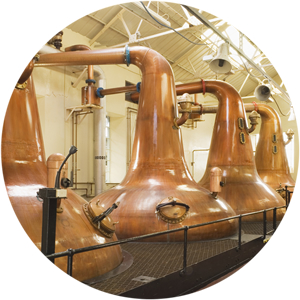
The UK spirits industry is booming.
With the number of distilleries at an all-time high, regulation is required to ensure there is no impact on the environment.
The water of life
Neat or with a dash? Enthusiasts may disagree on how to enjoy their dram, but for all distilleries water is essential. A reliable supply is critical, both for the whisky itself and for cooling in the production process.
Some distilleries use public water supply, but many abstract water from a range of different sources (groundwater, springs and rivers). Particular sources contribute to the distinctive taste of different whiskies.
Distilleries must ensure compliance with limits on:
- the volume of water they can abstract
- the environmental impact of the wastewater they discharge.
Distillery wastewater is highly variable, depending on the feedstock and production process used. It has the potential to be a very polluting waste product because of its:
- low pH
- high temperature
- dark brown colour
- high ash content
- high volume of dissolved organic and inorganic matter with high biochemical oxygen demand (BOD) and chemical oxygen demand (COD) values.
How WHS helps
We have worked with a number of distillery owners. Projects have included:
- Cooling water monitoring. We assessed abstraction from a cooling intake weir to satisfy regulatory requirements. We also designed and fitted a weir plate to control abstraction to the consented daily maximum.
- Flow monitoring to meet WFD objectives. We monitored the flow of the burn and the lade to estimate the impact of abstraction the burn and downstream river. This helped deliver the objectives of the Water Framework Directive.
- UKCP09 River Flow Time Series and Frequency Analysis. We monitored numerous sites to provide estimates of available resource, and provided an estimate of the impact of climate change at 20 intakes across 13 sites. Our database of baseline and future flows enabled bespoke annual minima-based flow frequency analysis and estimates of available resource.
- Monitoring for water availability. We assessed the potential water resource available at four intakes for three distilleries to validate/challenge the flow duration curve estimates derived by SEPA using the WHS LowFlows Enterprise software.
- Groundwater – surface water interactions. We assessed the potential impact of groundwater abstraction on a burn, 125m to the south of the production borehole. This was a combination of a desk-based assessment, with a conceptual model of the abstraction, and an on-site pump test to refine our theoretical estimates. Flows in the burn were also monitored for a short period upstream and downstream of the distillery to monitor the effect of the pump test and standard operation on flows in the burn.
The last word
Monitoring and controlling abstracted and discharged water for distilleries is vitally important. We provide a range of distillery consultancy services, including hydrometry, hydrology and hydrogeology.
Make it a double!